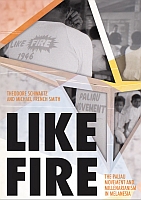Like Fire
The Paliau Movement and Millenarianism in Melanesia
Author(s)
French Smith, Michael
Schwartz, Theodore
Language
EnglishAbstract
Like Fire chronicles an indigenous movement for radical change in Papua New Guinea from 1946 to the present. The movement's founder, Paliau Maloat, promoted a program for step-by-step social change in which many of his followers also found hope for a miraculous millenarian transformation. Drawing on data collected over several decades, Theodore Schwartz and Michael French Smith describe the movement’s history, Paliau’s transformation from secular reformer and politician to Melanesian Jesus, and the development of the current incarnation of the movement as Wind Nation, a fully millenarian endeavour. Their analysis casts doubt on common ways of understanding a characteristically Melanesian form of millenarianism, the cargo cult, and questions widely accepted ways of interpreting millenarianism in general. They show that to understand the human proclivity for millenarianism we must scrutinise more closely two near-universal human tendencies: difficulty accepting the role of chance or impersonal forces in shaping events (that is, the tendency to personify causation), and a tendency to imagine that one or one’s group is the focus of the malign or benign attention of purposeful entities, from the local to the cosmic. Schwartz and Smith discuss the prevalence of millenarianism and warn against romanticising it, because the millenarian mind can subvert rationality and nourish rage and fear even as it seeks transcendence.
Keywords
Papua New Guinea; Millenarianism; Cargo Cults; religion; Margaret MeadDOI
10.22459/LF.2021ISBN
9781760464257, 9781760464257Publisher
ANU PressPublisher website
https://press.anu.edu.au/Publication date and place
Canberra, 2021Imprint
ANU PressSeries
Monographs in Anthropology,Classification
Australasian and Pacific history
History and Archaeology
20th century, c 1900 to c 1999
Social and cultural anthropology
Political activism / Political engagement


 Download
Download